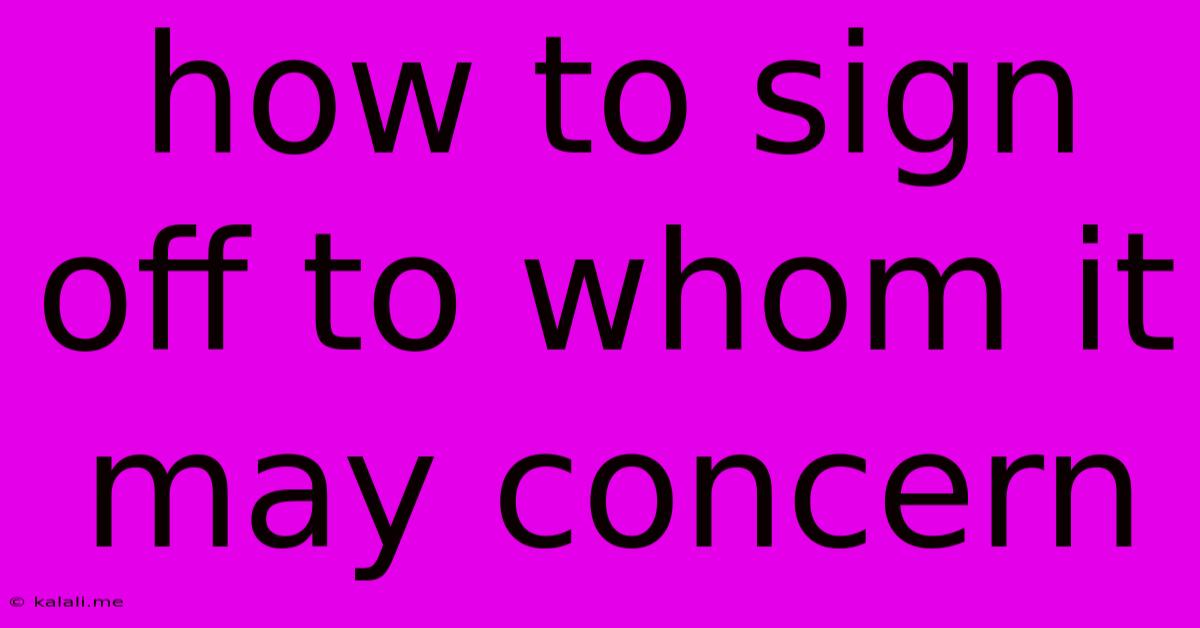How To Sign Off To Whom It May Concern
Kalali
May 19, 2025 · 2 min read

Table of Contents
How to Sign Off to Whom It May Concern: Mastering the Art of Professional Closings
Knowing how to properly sign off a letter or email addressed to "Whom It May Concern" is crucial for making a professional and impactful first impression. This seemingly simple closing can significantly influence how your communication is received. This guide will walk you through the best practices for signing off, ensuring your message leaves a lasting positive effect.
Why "Whom It May Concern" Requires Careful Consideration:
Using "Whom It May Concern" indicates you're addressing a general audience rather than a specific individual. This lack of personalization requires extra attention to create a professional and courteous tone. A poorly chosen sign-off can diminish the impact of your carefully crafted message.
Choosing the Right Closing:
The best closing depends on the context of your communication. Here are some suitable options, ranked from most to least formal:
-
Sincerely: This is a classic and universally acceptable choice for most formal communications, such as cover letters, business proposals, or formal inquiries. It's polite, respectful, and straightforward.
-
Respectfully: This conveys a level of deference and is appropriate for communications with individuals in positions of authority or when expressing gratitude.
-
Regards: A slightly less formal option than "Sincerely," suitable for most professional communications, including emails and letters.
-
Kind regards: Similar to "Regards," but slightly warmer and more personal. A good option when building a rapport.
-
Best regards: This is a common and versatile choice, often suitable for both formal and semi-formal communications.
What to Avoid:
Certain closings should be avoided when addressing "Whom It May Concern," as they can appear unprofessional or inappropriate:
-
Informal closings: Avoid overly casual closings like "Cheers," "Best," or "Talk soon." These are unsuitable for formal communications.
-
Overly familiar closings: Avoid closings that imply a pre-existing relationship, such as "Warmly," "Love," or nicknames. Remember, you're writing to an unknown recipient.
-
Vague closings: Avoid vague closings like "Thanks" or "Later." These lack the formality and professionalism required.
Beyond the Closing: Additional Tips for Professionalism:
-
Proofread carefully: Errors in grammar and spelling can undermine your professionalism. Always double-check your work before sending.
-
Use professional formatting: Maintain consistent formatting throughout your communication, including font, spacing, and paragraph structure.
-
Consider your audience: Adapt your tone and language to the recipient's likely background and expectations.
-
Keep it concise: Avoid lengthy or rambling closings. A short, professional sign-off is best.
Example:
Let's say you're submitting a job application. A well-structured email might look like this:
Subject: Job Application - [Your Name] - [Job Title]
Dear Whom It May Concern,
[Body of your email - highlighting your skills and experience]
Sincerely,
[Your Name] [Your Contact Information]
By following these guidelines, you can confidently and effectively sign off your communications addressed to "Whom It May Concern," leaving a lasting impression of professionalism and competence. Remember, even a small detail like your closing can make a significant difference in how your message is perceived.
Latest Posts
Latest Posts
-
Road Bike Tyres On Mountain Bike
May 19, 2025
-
How To Turn Off A Alarm System
May 19, 2025
-
Drill Bit Size For Red Rawl Plugs
May 19, 2025
-
Acta Pilate Pilate Report To Caesar
May 19, 2025
-
Fl Automate Frequency With Note Played
May 19, 2025
Related Post
Thank you for visiting our website which covers about How To Sign Off To Whom It May Concern . We hope the information provided has been useful to you. Feel free to contact us if you have any questions or need further assistance. See you next time and don't miss to bookmark.